Revolvers don’t get enough love.
We live in an age of All Things Tactical from our poly pistols to our not-a-45-ACP 1911s.
Then there’s the rampant wearing of 5.11 cargo pants and ‘Merica shirts. So, where has all the revolver love gone?
It’s fallen by the wayside thanks to the greater capacity and simplicity of semi-autos and I think that’s a shame.
If you want to be a well-rounded shooter you need to learn to run a revolver.
Meet your “My First Revolver”, revolver: the Smith and Wesson Model 686.
Prices accurate at time of writing
Prices accurate at time of writing
-
25% off all OAKLEY products – OAKLEY25
Copied! Visit Merchant
Table of Contents
Loading…
Into The Weeds
The 686 can trace its lineage back to 1981, making it not quite as elderly as other revolvers out there. It’s basically the stainless version of 1980’s blued Model 586.
Smith and Wesson designed it to be a reliable, accurate gun that gets used, not a safe queen or casual pocket carry pistol. The 686 is meant to be used.
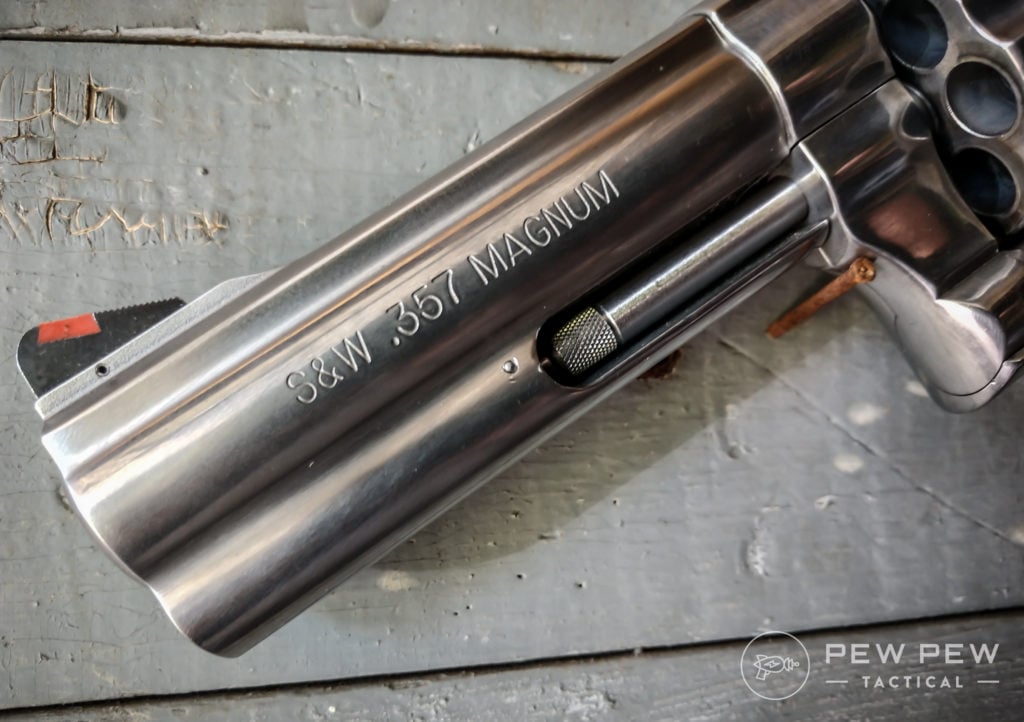
Details for the detail lovers.
The 686 was created based on the older K-frame .357 Magnums that were, at the time, favored by a ton of law enforcement (I’m speaking of the Model 19 and Model 66).
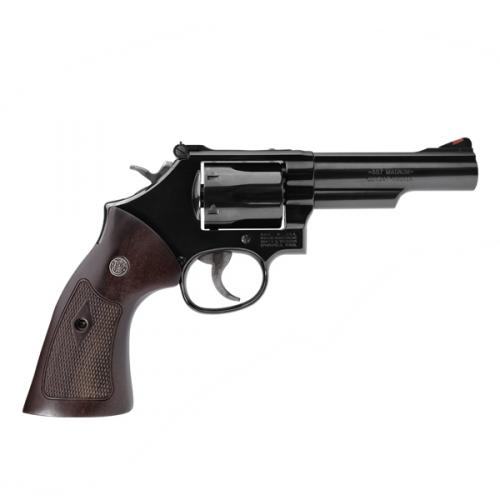
This model is built on an L frame, a size similar to the K only with a larger cylinder and a bit more heft in general.
There have been multiple iterations of the 686 – you’re going to hear them referred to as variants and dashes – featuring different barrel lengths and cylinder capacities.
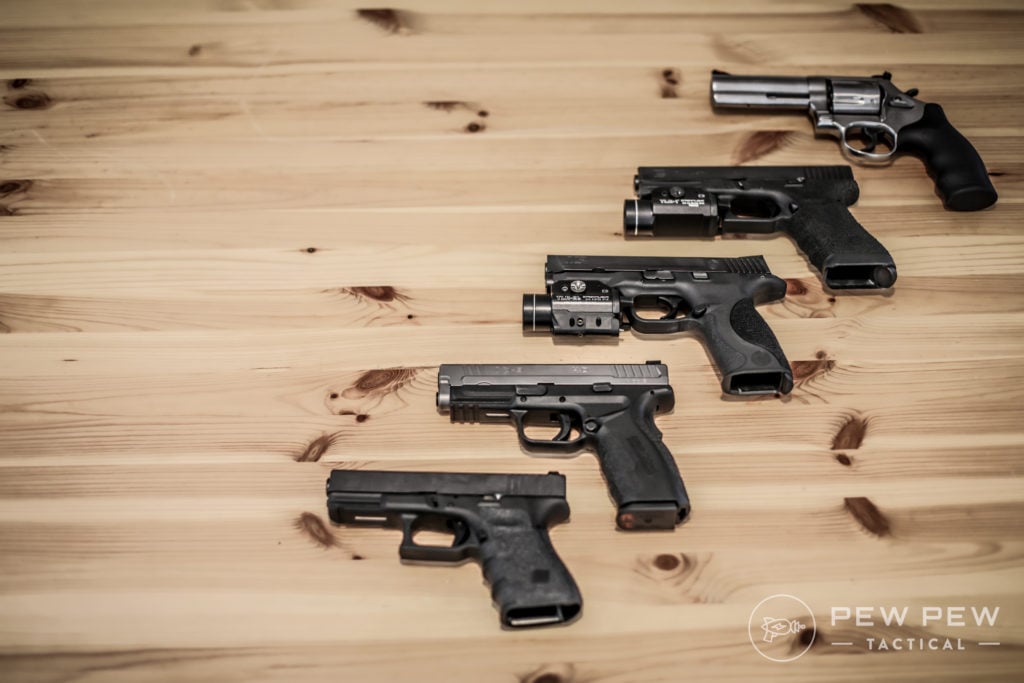
My baby is the 686+, a variant with a seven-round capacity and 4.125-inch barrel chambered in .357 Magnum. Sure, you could also run .38 Special through this revolver, but why skimp on oomph?
The 686P has a slim enough grip to allow a good hold on the gun, magnum rounds or not, and is rather hefty. It weighs in at 39.0 ounces, empty, a big chunk compared to the 21.16-ounce empty weight of my Gen 4 Glock 19.
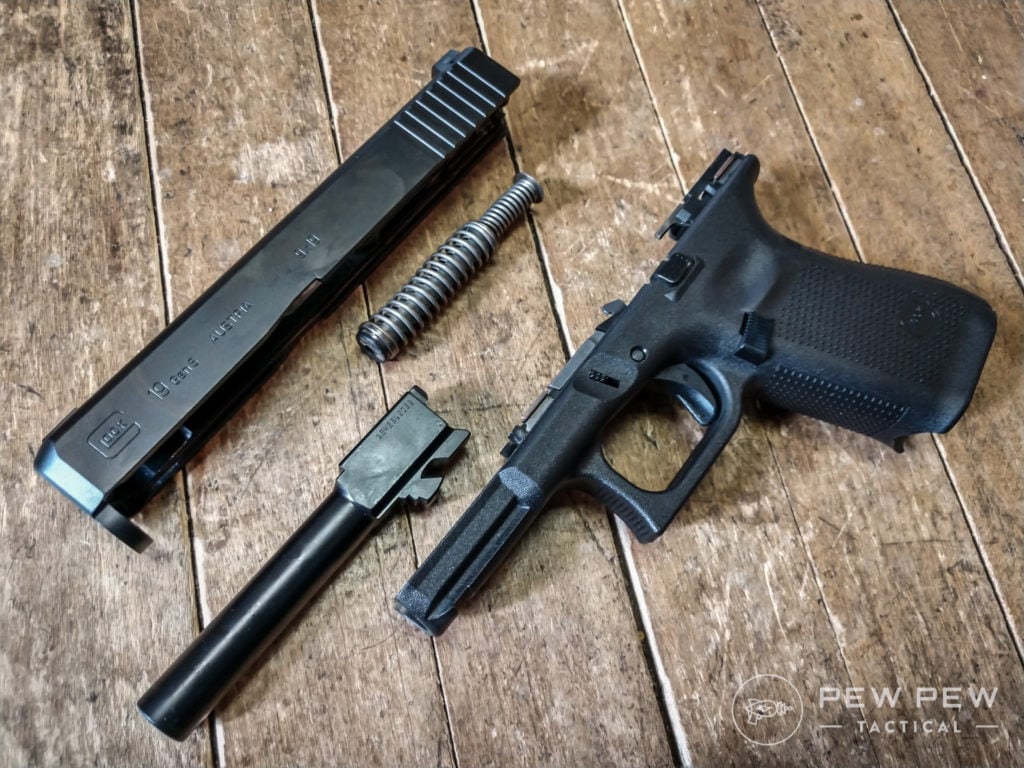
Some of that weight comes from a heavier top strap and forcing cone, important features to mitigate felt recoil and increase accuracy.
Specs include an overall length of 9.56-inches, satin finish, and factory front blade and adjustable rear sights. The gun ships with black rubber grips with finger grooves.
As I mentioned before it’s chambered in .357 Magnum so you can also fire .38 Special rounds through it – .38 Special +P, if you like – and is an L-frame, stainless steel, seven-shot revolver.
Here is our editor Eric shooting his 686+ with 38 Specials.
Revolvers aren’t like semi-autos. There is no external safety, no magazine release, and no slide lock on this DA/SA bad boy, just the hammer and cylinder release, both checkered for smoother operation.
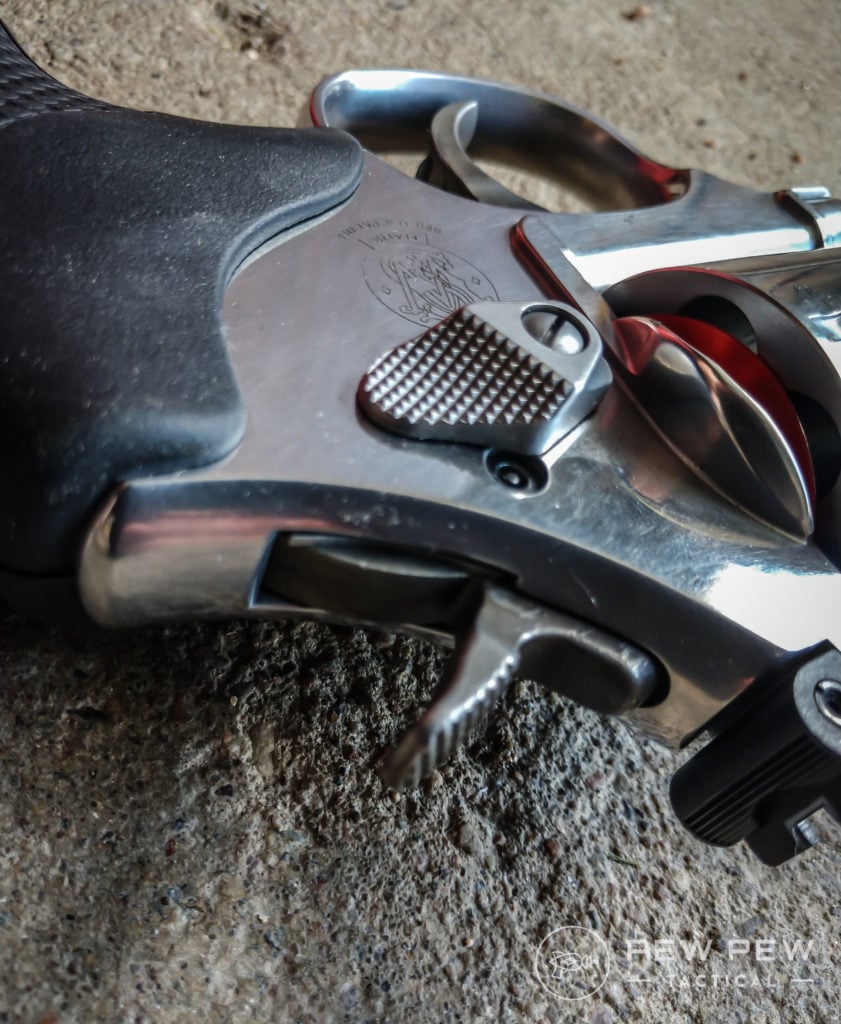
Granted, although revolvers appear simpler on the outside they are a bit more complex internally; if your Glock goes down odds are good you can repair it yourself but if your revolver fails it frequently becomes a case for a qualified gunsmith.
Then again, you haven’t lived until you’ve sorted out the internals of a revolver. Come on, I can’t be the only gun geek here.
Pew Pew
This specific 686+ has seen a lot use over the years and eaten every kind of ammo imaginable.
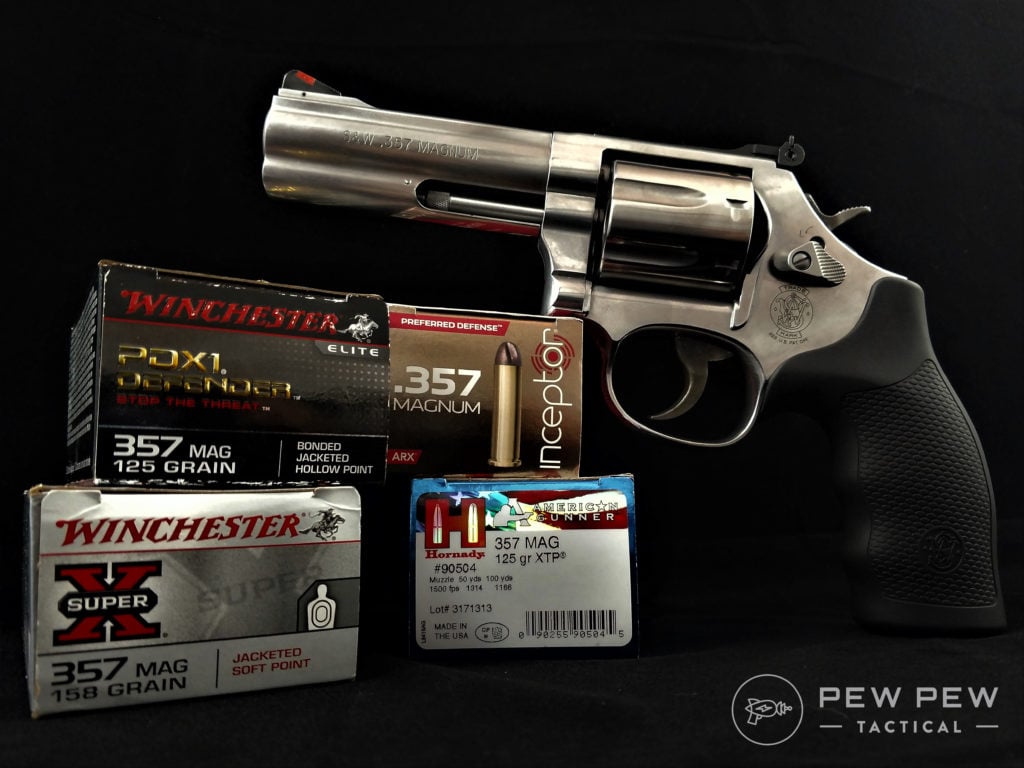
Barnes VOR-TX .357 Magnum 140 grain XPB HPs are a great option but if you want a bit less felt recoil there’s always Hornady .38 Special 110 grain FTX. Don’t do yourself the disservice of using only one or the other.
Prices accurate at time of writing
Prices accurate at time of writing
-
25% off all OAKLEY products – OAKLEY25
Copied! Visit Merchant
Make use of the gun’s .357 Magnum and .38 Special capabilities and learn to be fast and accurate with both as well. Oh, and learn to run that trigger DA and SA, not either/or.
Prices accurate at time of writing
Prices accurate at time of writing
-
25% off all OAKLEY products – OAKLEY25
Copied! Visit Merchant
The factory rubber grips fit my hands well; some people immediately ditch the grips but they happen to appeal to me. Even the finger grooves fit my hands properly which is not something I can say for the finger grooves on, say, Glocks.
The beefy design of the top strap does make the gun slightly heavier toward the muzzle, meaning it is not as carefully balanced as some of the semi-autos you might be used to using.
There’s one good thing about that weight, though: recoil control.
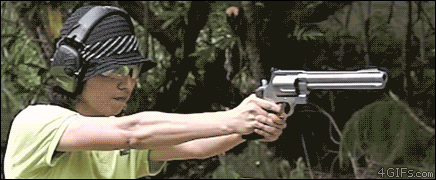
If you run the 686P with .357 Magnum, be prepared for noticeable felt recoil. It’ll take you some trigger time to learn to fire the gun smoothly, especially for follow up shots.
Here is Eric again with full load .357 Magnums…
That doesn’t mean it isn’t accurate; this revolver is precise and performs beautifully offhand and from the bench.
Under 15 yards it is possible to maintain a just-barely-single-hole, five-shot group firing the first shot DA and all other shots SA – that requires me to take my sweet time.
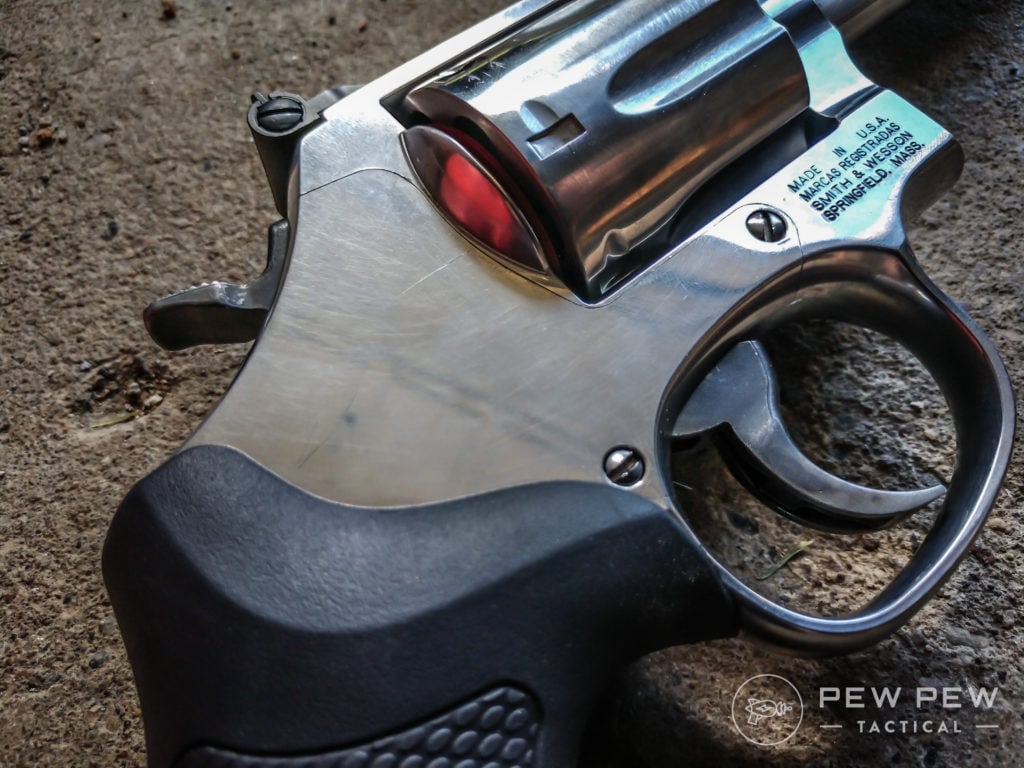
Stretching out to 25 yards, shooting from the bench, the average five-shot group measures around four inches.
Double-action for all shots fired expands my groups at 15 yards to an average of three inches with some exceeding four inches. Again, that’s slow-fire, no rush.
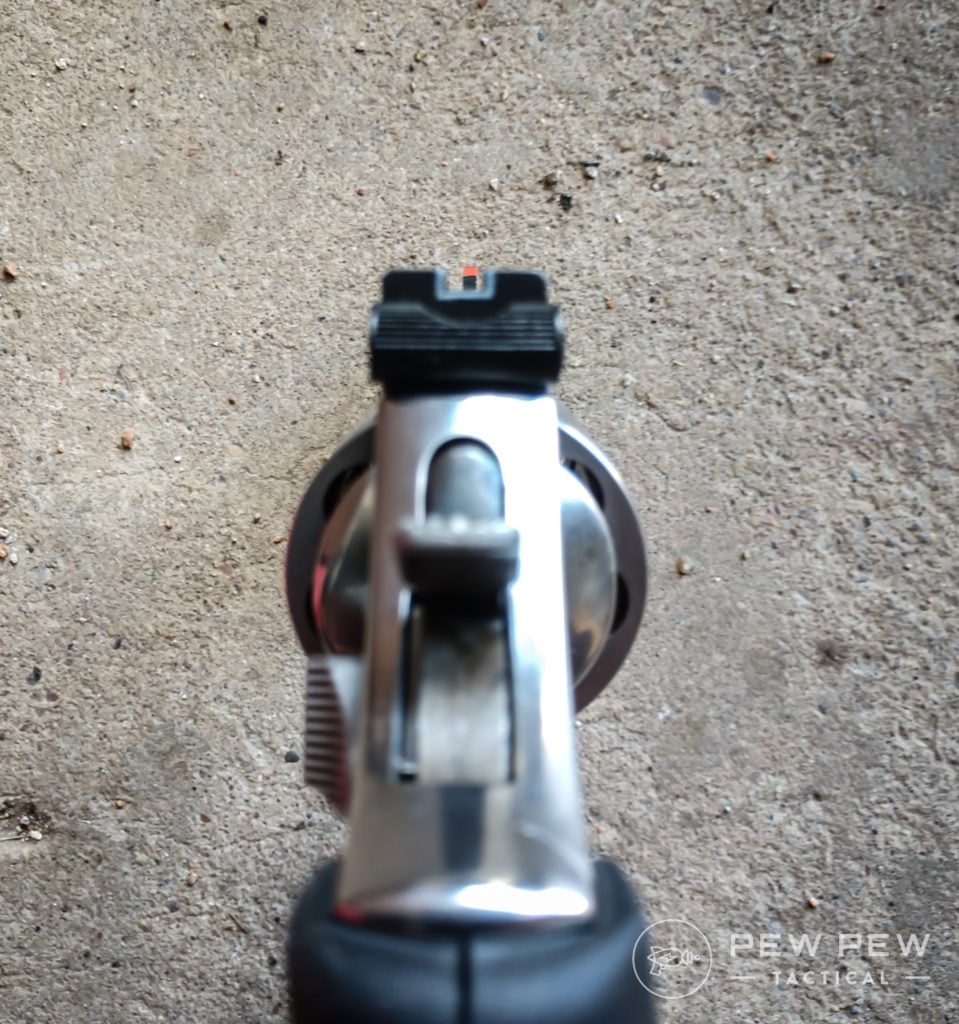
Using .38 Special does take some of the recoil-driven yikes out of the 686P. This is a gun that loves its Inceptor .38 Special 77 grain ARX; shooting offhand at ten yards the gun delivered a five-shot group of 1.3 inches.
Some brands of ammo don’t seem to agree with it especially when you start using +P. For example, Federal Personal Defense .38 Special HST +P use resulted in five-shot groups at ten yards averaging six inches.
So, what happens if you end up rapid-firing the Smith and Wesson 686P? My first disclaimer is to remind you that practice is king. If you don’t put the work in you will not be able to run the gun as well; if you put the work in your revolver skills will be on point.

Firing the first shot DA and all other shots SA I can keep most shots in the A zone of an IPSC target but I would not call it pretty. That’s with .38 Special. Switch it up to .357 Magnum and I can just keep shots in the C zone. Practice, guys. We all need it.
The trigger of this gun is worth a mention. Double-action the pull weight is around ten pounds; single-action it drops to 4.3 pounds. The Performance Center did nice work on this trigger.
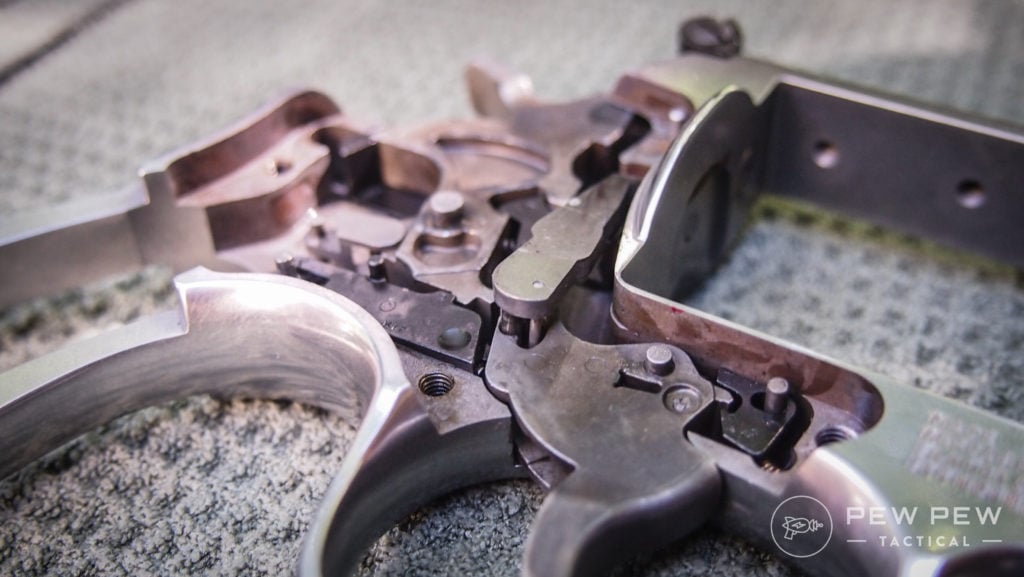
The pull is smooth and consistent when shooting double-action; there is no stacking or grit. Best of all is the crisp, clean break. This is a good factory trigger. Reset is longer than you may be used to from semi-autos, depending on your gun, but it remains workable.
Kudos to Smith and Wesson for producing a nice factory trigger.
If you intend to carry the 686P, be prepared for some differences from carrying a semi-auto.
First of all, is the bulk; the 686P cylinder is wider than a Glock’s frame and the curves of a revolver can be harder to conceal, too. This gun is a bit large for concealed carry.
Prices accurate at time of writing
Prices accurate at time of writing
-
25% off all OAKLEY products – OAKLEY25
Copied! Visit Merchant
It isn’t that you couldn’t do it just that it isn’t ideal. For open carry or handgun hunting hogs it works well. You’ll find your drawstroke is markedly altered from drawing a lighter, smaller pistol, so get some practice.
Everything makes it different from the weight to the shape to the overall size. It might feel awkward at first but eventually, you’ll get the hang of it.
-
25% off all OAKLEY products – OAKLEY25
Copied! Visit Merchant
Failures
Yes, revolvers can fail. Anyone who claims otherwise either doesn’t know what they’re talking about or…doesn’t know what they’re talking out. In fact, I had a failure with the 686P.
I haven’t tracked round count as well as I perhaps should have but I would guess the gun was perhaps 1500 rounds in when it failed.
It was loaded, the trigger was partially engaged, and the cylinder wouldn’t move. And when I say it wouldn’t move, I mean it would not budge at all. In the end I pulled an old business card out of my range bag to release the cylinder.
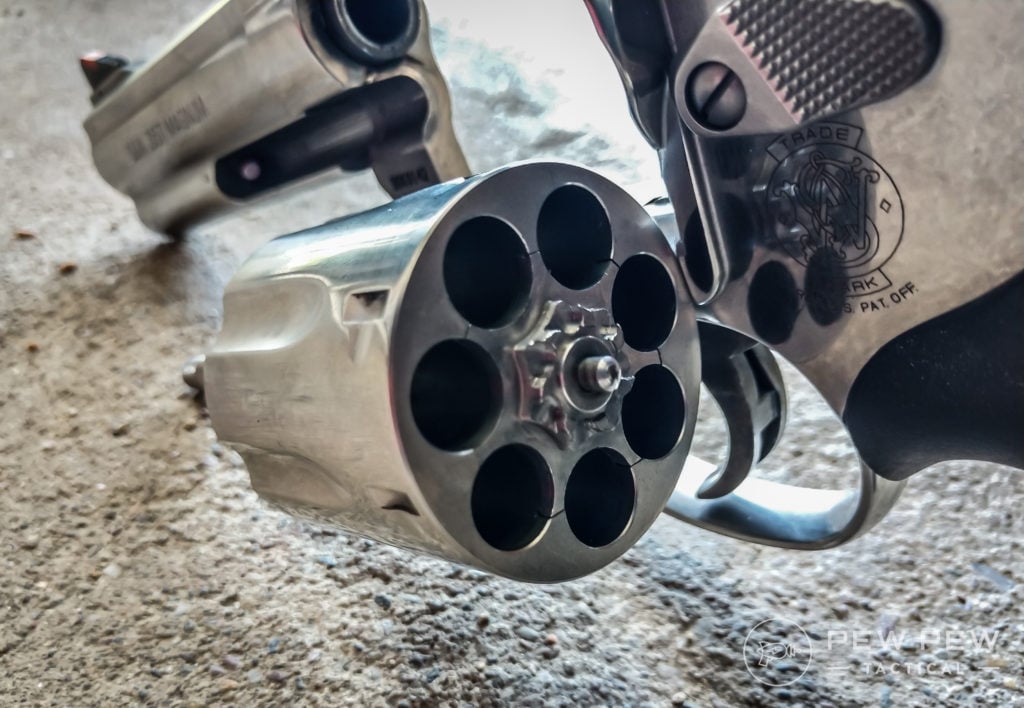
The ejector rod was backing out – not exactly a unique problem – and it was a fixable issue. However, there was no warning; the revolver simply stopped functioning.
Now imagine yourself experiencing this kind of failure while using a revolver to defend your life. You won’t be able to jimmy the cylinder open with a business card and tighten the ejector rod, you’ll be without a gun.

This makes the case for backup guns but should also serve as a warning about revolvers as EDCs. A revolver can make a good EDC but you must be familiar with the reality of failures.
We aren’t talking a tap-rack-bang scenario, we’re talking you’re out of the fight.
Reality Of Revolvers
It’s a good idea to be competent with all platforms. Whether you like revolvers or not you should be able to use one. The Smith and Wesson 686P is a preferred revolver of mine because it’s well-made, accurate, and comfortable.
Yes, .357 Magnum makes it a bit less comfortable and is not my favorite cartridge ever to run through a handgun with a four-inch barrel, but the gun’s bulk really does negate felt recoil.
That said, I would suggest good .38 Special loads if you’re going to carry this gun. In addition, learn to use either speedloaders or speed strips. I prefer speedloaders, personally.
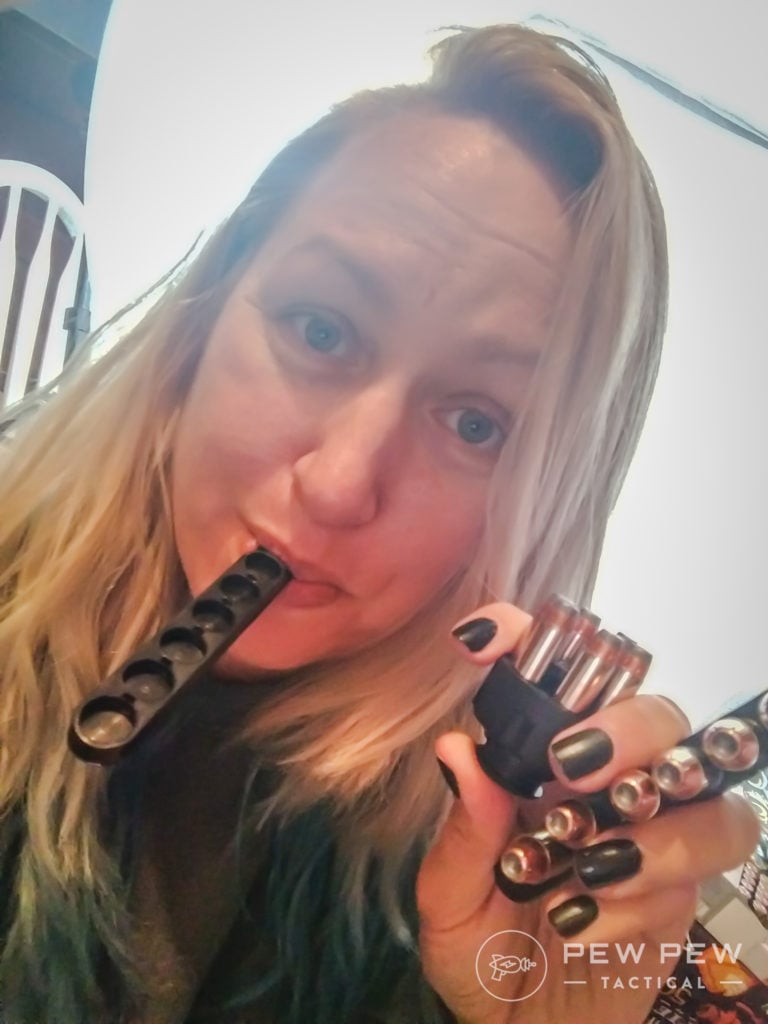
This is a nicely done revolver and a solid choice for your first – or tenth – revolver. Hey, you can’t do Wheel Gun Wednesday if you don’t own a revolver. Spend some hands-on time with the 686P.
It’ll win you over!
By The Numbers
Reliability: 4/5
The 686P is a reliable gun but I’m docking a point for the ejector rod issue. Although it was an easy enough fix it would be a catastrophic failure in a self-defense scenario. Revolvers do tend to fail less often than semi-autos but they also fail in big ways.
Ergonomics: 4/5
Ergonomically the Smith and Wesson 686P is well-done. If you don’t like the rubber grips it ships with, swap them out for something you do like. I like the angle of the grip on this revolver (there are revolvers out there with grip angles I despise). The gun is made for a solid grip and the accuracy that comes with it.
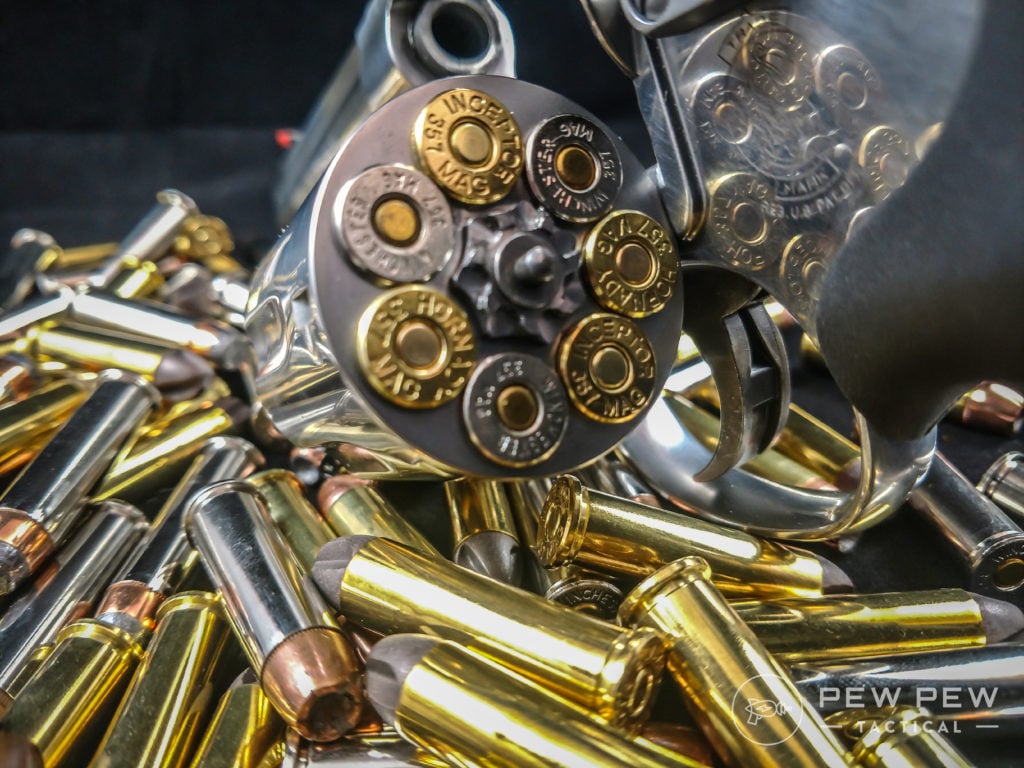
A word on balance. I wish this was a more balanced gun. Having the added weight all in the front makes firing for extended periods more difficult and has a negative effect on accuracy.
Accuracy: 3/5
This one might seem harsh but I’d prefer my carry guns be a little more precise. It isn’t that the 686P isn’t accurate – it definitely is – it just doesn’t produce groups quite as tiny as I’d like from a potential carry gun.
Do I trust it to hunt hogs? Yes.
Could it be used as an EDC? Of course, it could, but you’d better put in the practice. Remember, accuracy degrades when adrenaline floods your system.
Customization: 3/5
There isn’t a lot of room for customizing revolvers. Sure, you could have a gunsmithing genius like Bobby Tyler work it over – and he would do a stellar job – but it’ll cost you.
If you’re doing it yourself, grips are the most obvious part you can change. We also have a guide to Tuning Revolvers. Otherwise, go to a professional.
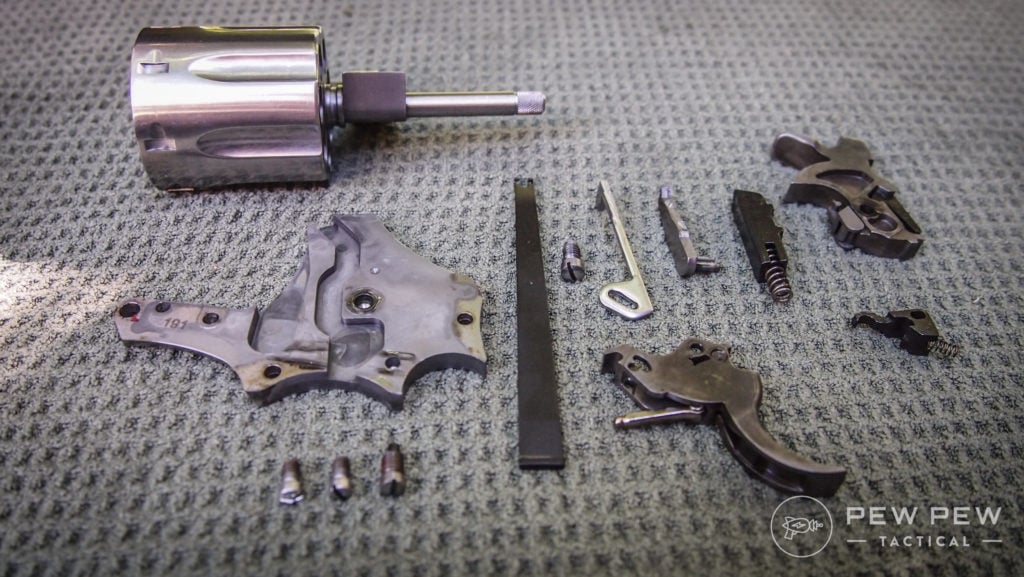
Value: 4/5
This is a decent value. You’ll probably find it around $700 at your local gun store. If you want a quality revolver for handgun hunting this one is a logical choice; if you want one for EDC this gun might be a bit oversized.
Looking for a good revolver for the range? This is your gun.
Overall: 4/5
Conclusion
The Smith & Wesson 686 is a fantastic revolver with utter reliability, comfortable ergonomics, and beautiful aesthetics. Its accuracy and customization are par for the course. But for a personal protection gun it’s perfect and comes in different barrel lengths and even a Plus model with 7 rounds of .38 Special or .357 Magnum.
So I’ll go ahead and say it.
I love this gun.
Although my go-to for concealed carry leans toward semi-autos I do believe revolvers have their uses. Revolvers can be carried – but for heaven’s sake, carry a speedloader – or used for hunting. Or range time. It’s up to you.
Prices accurate at time of writing
Prices accurate at time of writing
-
25% off all OAKLEY products – OAKLEY25
Copied! Visit Merchant
.357 Magnum is a fantastic cartridge, too. Everyone should own at least one gun chambered in .357 Magnum. Just saying.
What .357 Magnum revolver do you have? You DO have one, right? Let us know in the comments! For some more awesome six-shooter goodness, take a look at the Best Beginner Revolvers!

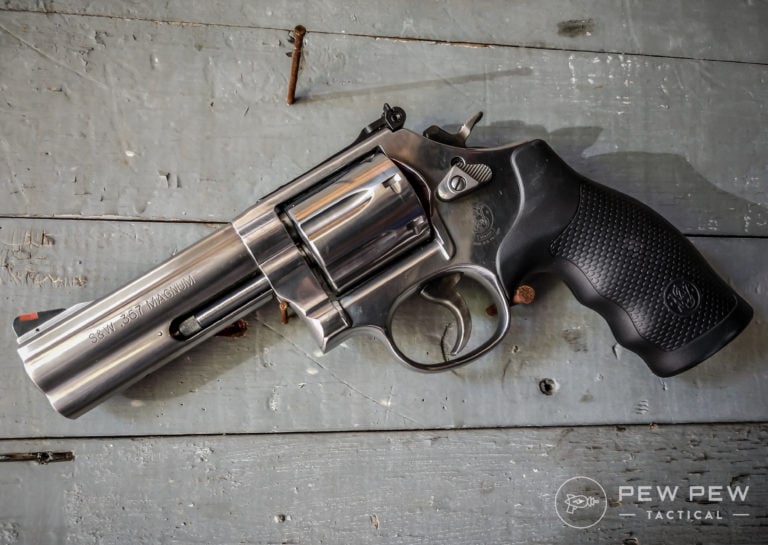
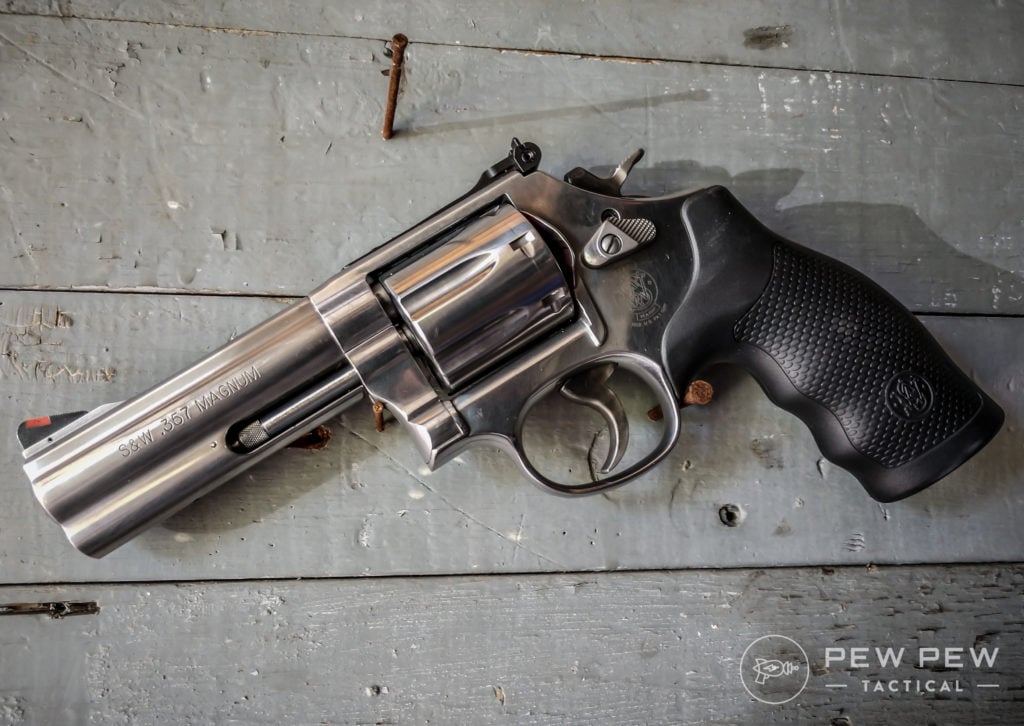












58 Leave a Reply
Do not buy stay away from smith @wesson they are no good and they do not stand by there warranty anymore having problems withere 686 revolvers when using double action you will get rounds that do not fire for some reason I thought at first it was the ammo but it kept getting worse to a point that 3 @4 rounds would not fire and the bad part is they know about this problem and do not cover under warranty said it was from not firing correctly my god man you pull the trigger and it should shoot but if you read the entire manual it states you need to wait before firing when using double action for the trigger to reset bullshit do not buy they are not close to being worth it get a Taurus don’t waste that much money on skith@wesson garbage
Obtaining revolver proficiency is like being able to drive a stick shift. Your everyday drive may be an automatic, but it's an adrenalin rush to throw a snarling 5-speed around a slalom course. And it may save your life if an automatic isn't available at a critical time. I have a 686+ as a workhorse, and I can use it to hammer something that needs it. I have a an LCR .357 I carry for concealment with .38 +Ps. In my safe I have a pristine 1974 Colt Python, which sleeps beside a 1972 Dan Wesson 15-2 stainless PistolPac kit. The Dan Wesson has the best trigger I have ever used in any handgun. Smooth as butter and repeatable. So, .357s will always have a home with me. Very good article.
I'm looking to buy a S&W 686 International DX with 6 inch barrel. Any advice or warnings re this gun? Are they with worked internals oe just a standard 686 in fancy clothing??
I was hoping to see mention of the trigger lock and it's history of failure.
I own the six inch version of the 686+.
I also own a colt python new version, a Ruger GP100
as well as a model 60 and taurus 686.
imho my 686 plus is my favorite.
Ive got to know:
I carry a 642 smith, and I can group with it as well as I can with a glock 19, (though it took twice as long to become proficient). Specifically, using Remington semi jacketed 157g hollow points. I have always heard (and found) that smith revolvers were accurate, so I'm wondering, was your accuracy rating a problem with the example of the revolver, the ammunition choice, or fit to your personal hands?
I dont imagine that youre a slouch at shooting if you're writing for this blog, or that this is your first revolver review, so i'm intensely curious about your reasoning. I've always lusted after the 686+ and if there's a reason I should move on, I'd be happy to know, lol.
I freely admit, I'm far from an expert. Quality control-tools wear during a production run as well as material and design changes. I've never seen an author say sn xxxxxxx
to sn xxxxxxxxxx seem to be the best of them. RE: 686 plus. Frankly, we've all heard about inflation. Right now running like 845, add in shipping like $50 tax ffl fees and you are over $900. My local range has one looks to be lightly USED and it is priced at $899. It is or has gotten NUTS.
I have a NIB model 37 ,snubby I bought that had been sitting in a safe for over 50 years BEAUTIFUl,a 586 -8 that I use when I go deer hunting and a 686-6 2 1/2 inch barrel . Going to have a 44 before the week is over .Can't decide.Actually the 38 went out the door with about 200 rds of ammo the other day when my daughter left.She just turned 21 so she can conceal carry in Maine.She just opened up the gun hutch and said "you would think you had stock in S&W.I better take this one before you lose it.Closed cabinet door and said "there. now you have an excuse to go buy another one lol" .She has owned a PPK since 16 ,taken hunter safety plus course for hand guns.
Thanks for the review. I've always wanted a 4" 686 but never have ended up with one. I did however find a used 1984 manufactured 6" 686 years ago at a pawn shop. Great shooter.
.357's? A couple 2-1/4" SP-101's, one with external hammer spur, the other without. 2 GP-100's both in 4", one blued and one stainless, a 4" Smith model 13, (another pawn shop find) and the crowning jewel, a 1981-2 manufactured Dan Wesson from the Monson factory. I bought it used with the 4" barrel on it. Smooth shooter.
Haven't had the capital to start a gun collection until recently. It began with the inheritance of my Pop's S&W Model 13 a few months ago. Now I want ALL the .357s! This will likely be my next one.
I own many SW revolvers including the 686. Great article and I agree with almost every part of your review except the part about balance and reacquiring the target. That is simply solved by modifying your weak hand forefinger just a bit more forward under the trigger guard to support the weight of the muzzle, but obviously not forward of the front of the cylinder for obvious reasons.
i love this as my carry gun, i stand 6'2.5 and have a big hand . this guns fits my hand. i put a trace laser sight on it.
Great S&W 686P review. I owe (2) revolvers...a Ruger Speed Six and of course a S&W 686P.
That by the way it was my first handgun ever.
I have a revolver sickness for old smith's pre-lock all makes models barrel lengths. Great article and have never had a revolver failure. I have acquired a correctional officer model 64 that is clearly old. It is an absolutely a joy to shoot. 686 was the Cadillac and an awesome peice. 2cents...
That's a good review of this weapon. I became familiar with the. 357 when choosing my weapon on the job. It is a well balanced gun and I found it handled well.
Great review. I am a revolver guy since the early 70’s. I shoot at the least 1k - 1.5k a year, of different guns I own each year. I have never ever had a failure to fire due to the revilver’s problem. A revolver requires you to inspect and maintain it. By that I mean, the ejector rod deal was a lack of attention on your part. I suggest for revolver owners/shooters to clean and lube often. At least 3-4 times a year if you shoot it frequently. Take a turn with your fingers on that ejection rod and you will not experience that again. Make sure all ejection parts are tight, clean, and lubed. That is why you always see an experienced revolver owner/shooter, eject his spent rounds with the barrel and cylinder pointed straight up to the sky to let gravity keep anything from getting between the ejector parts and the cylinder loading face. Also, revolvers are held together with screws. Always, always check them to make sure their tight to spec. I have had light primer strikes on some ammo, but my reloads, and premium ammo never seems to FTF due to primer strike. Revolvers also require more frequent cleaning than most semi-autos. ONE SAFE TIP : If you squeeze off a round in a revolver, and it doesn’t go bang, ALWAYS point safely down range and count to 10. It in all probability is a primer failure that could go off delayed by a few seconds. This has happened to me twice. Do not open the cylinder, do not squeeze the trigger, point it in a safe direction and count to 10. My good friend also had this happen to him with a Glock, He cleared the round and it went off during it’s ejection flight, 18 inches from him in mid air, so same rule applies for semi-autos. Pointing safe direction and count to 10. It has nothing with the gun in this case, but a faulty round. It does happen. I love watching youtube vids and this is the main safety issue I see these people do. Eject or open or squeeze prematurely at great risk. If it hzppened twice in my lifetime, and I have a friend that it happened to also, It is frequent enough for safety concern. i do not see this taught enough. In Florida, they teach this during every concealed carry weapons class, and shot some gross photos of what can and did happen.
Excellent detailed comments, much appreciated. I have a 686-6 plus but with a 3” barrel and perhaps that’s why I don’t feel the “front end unbalance” that the article’s author mentioned more than once. I love shooting 357 Magnum - recoil is not so bad really. But, when I fire a few cylinders of 158 gr 357 Magnum then fire my 9 mm Glock, the semi-auto is sweet without any felt recoil in comparison. I also have an 8-round Ruger Redhawk 5.5” that has slightly less felt recoil. These wheel guns are for the house not for EDC, at least for me. Thanks again for a nice commentary.
Right out of the box and on the range with my sons, my 357 686+ with a three inch barrel jammed tight after 5 rounds. Having previously read that the ejector rod “May” be the problem. It was a quick fix and indeed it was the ejector rod that had backed out about 2 turns. I’ve had the revolver almost three years and I’m just starting on 3000 rounds fired so far. All I shoot are full charged rounds and never have used 38 specials because I was told often they may leave a ring on the inside of the cylinder. Great gun, beautiful accuracy, tough as nails, and pretty too.
I was taught to count to at least 30, slowly. Personally, I have had hangfires several times, generally with rimfires, but also be center fire ammo. When it does happen, I usually wait at least a ful minute.
Coming from the days when as police officers we all carried S&W revolvers, mine was a 586 which I still have and carry, we learned to use clear fingernail polish on the ejector rod and screws as loctite worked as good and was not permanent.
Exceptionally well written review of this weapon. The article is authoritative, informative, unbiased and easy to read. Kat's writing was very helpful in deciding whether to purchase this weapon and subsequently, how to employ it.
Glad you enjoyed it!
"Gave" my 3" barrel 686+ to one of my sons. Unfortunately he lives in NY state, so it's still in my gun safe in Arkansas. It was the second handgun I purchased (after a S&W 638). I agree that it's too much to carry. Maybe my son will move someday and he can finally take possession.
"Fully field-stripping your revolver isn’t necessary more than once or twice a year and does require a working knowledge of your gun’s parts and functions." There is no need to field-strip a revolver twice a year. It is not necessary and creates the potential for damaging the revolver or losing parts -- the average user shouldn't go there. However, it is not a bad idea to remove the crane periodically (once every couple of years, depending on usage) and clean out the channel in which the ejector rod sits -- it can become clogged with residue (a mix of gun oil and powder) and give the gun "cylinder cramps."
In telling people about revolvers, I think it is also worth mentioning timing - so folks know how to detect problems with roll-up (e.g., detecting a worn hand) and line-up of the cylinder with the forcing cone (which if not right can result in the revolver spitting lead). These are problems that may affect older or used revolvers and emerge slowly -- and highlight one of the real benefits of a revolver -- that is, things can go wrong, but the revolver often gives the user advanced warning that it needs a little attention. This is also true of the problem with the ejector rod backing out -- this is something that the user should detect long before it becomes a problem. It is the user's job to inspect the revolver periodically to make sure everything is present and working, just like the user of a semi-auto should check his or her magazines and magazine catch from time to time. The user should of course scan the revolver to make sure the grips are on tightly, the sights are present and affixed correctly, the cylinder rolls properly, the cylinder release is working right, the forcing cone is not cracked, etc., as a routine part of carrying and using the gun. How in the heck can someone shoot any weapon without checking it out first? A lose ejector rod should never catch anyone by surprise.
Any discussion of revolvers should include mention of lead bullets -- which are very versatile and are used a lot more often in revolvers than in semi-autos. Lead bullets tend to be very accurate (since they generally obdurate well, certainly better than jacketed bullets do) and range from the 148 grain HBWCs (very mild) to the 158 or even the "hard cast" 185 grain SWC (the Kieth bullet is outstanding). These give the .357 Magnum revolver a huge range in capability, from range work to hunting large animals. The article seems to reflect an interest in the more lightweight, faster rounds -- which have a role -- but didn't mention the classic 158 grain load that works so well. It also misses mentioning this -- that the .357 revolver firing the well-known 125 grain load at 1500 fps is one of the most effective man-stopper bullets of all time and exceeds the effectiveness of just about any semi-auto (pick a caliber) out there.
In short, I'd rate the article a 4 for enthusiasm and a 2 for knowledge of the revolver.
Well said!!
Brilliant!
I own three .357’s. A Smith 686 ( no, not a 686+) with a scope and an 8 3/4 inch barrel. A Smith Model 19 snubbie, and a Colt Python 6” bright stainless. The 686 with its 8 3/4 barrel obviously is quite nose heavy. Not liking its factory grips either, I massaged a pair on N frame wooden handles to fit. Improved things quite a bit... and, the gun is very accurate. I would say it’s a lot more accurate than the Python but I’d be leading you on. In the 29 years since I bought the Python I’ve never fired it. It’s just too pretty to get dirty. The Smiths... well, they’re like a 4WD pickup. They were kind of made to get dirty.
Any factory smith & wesson should out shoot the shooter for accuracy. I’ve shot and taught revolvers since about the time autos were getting popular in law enforcement.
They are machines and can fail, usually due to poor maintenance just like most machines. A person well experienced in just autos may not know what to look for in taking care of a revolver. It boils down to, “know the condition of your weapon”. If you get a revolver and want to use it for defense. Seek out some teaching on them and you will have a very trouble free pistolero.
Learning to Run the trigger double action only will help you stay out of trouble in court if you defend yourself with a revolver. Study the situation and have a reason for why you would switch to a revolver ‘cause they are a different animal.
Its a little unreasonable to take a way a point for reliability because you forgot to tighten the ejector rod assembly. Would you consider your car unreliable if a wheel fell off because you forgot to tighten the wheel nuts? The chances of a 686 S&W revolver ever failing are minuscule as long as you assemble it correctly and keep it clean.
My 686+ was my first modern-cartridge revolver purchase (I had two given to me in the past). It followed a series of replica cap-and-ball revolvers. I gave up that hobby some years ago. As I got older, the work of cleaning and maintaining them--along with loading them--eventually took too much fun out of shooting them. I actually made my purchase because of Hillary Clinton. After acquiring a string of semi-autos over the years, I saw the 2016 election approaching with a lot of dark clouds gathering over 2A. Having toyed for years with the idea of adding a hefty .357 to my collection, I ordered it on election eve 2016. I opted for the 686+, due to the extra-round capacity. I went with a three-inch barrel so that I could carry it concealed. "This gun is a bit large for concealed carry"? Not for this bigger-than-average bear. A Remora IWB holster works well for me all day long. I haven't had a revolver itch to scratch since my Hillarious purchase of three years ago. I suppose I could thank her that I finally made it. But I won't.
COLT
MODEL: TROOPER MARK III
CALIBER: 357 MAG
4" NICKEL
WOOD GRIPS
It’s so bad ass!
S&W model 19, 6" barrel. Love my revolvers.
Charter Arms - Mag Pug ... Loud, Shock and Aw, 7-15 yards, 4"-6" bench, 8"-10" two hands. Concealed Carry Weapon. Relieves my arthritis symptoms for a few days. 125 gr JHP, fast powders work best in mine.
Wheelguns will always have a place in my home. Ruger .357 LCR for deep concealed, King Cobra for OWB and heavy range work with .38+P. Dan Wesson 15-2 PistolPak for history and coolness, and 1974 Colt Python just because. We shoot them all regularly. My wife also loves the .357 kick.
My 357 is Ruger Security Six...stainless, walnut grips...really beautiful. My buddy likes his Colt Cobra. We trade off at the range and shoot his reloads. Have fired 686 and it is very smooth and accurate. Hope to get one soon
Correction: Colt Phyton...my bad
I have a Manurhin MR73 - and I would not trade it for anything! I just recently completed Front Sight's Defensive Pistol class with it, and qualified as a Distinguished Graduate. Great shooting revolver, fantastic trigger, and very reliable. The only malfunction I have had is a failure to fire - cartridge did not detonate when the primer was struck.
I have a Taurus model 66 7 shot 4 inch
.357 and it's a very nice firearm. Now I'll wait for the Taurus haters......
S&W 19 and 66, with a Ruger SP101 thrown into the mix....
nice honest, fact-based editorial. Thank you.
Love the 686. Absolutely have a competent gunsmith modify the trigger. Close to 1000 safe rounds fired through my brothers modified 686.
Hey! This is a great review. It shows the positive and the negative part of the Smith & Wesson Model 686.
I just bought a new 686 plus deluxe, I took it to the range yesterday and I love it. It has a perfect SA trigger pull and the DA is stiff, but not onerous. This is a great revolver.
Suggest you shouldn't knock off points for safety on an obviously altered gun. Whoever lightened the trigger pull to a ridiculous level is the unsafe culprit.
Been a Glock guy until a friend let me fire off his "6 shooter" Next thing ya know, I got a S&W 686P 4" 357/38. This baby is sweet. Still love my Glocks, but the S&W will be along for the ride to the range. :-)
I finally got my first S&W in Dec. it was the 686 plus 357 in a 3" barrel.. Put 75 rounds of 38 sp+P 125 gr. Golden Sabers & 75 rounds of 357 mag ammo 125gr. Hornady CD's. Started out at 15 feet then 25 feet. The DA was similar too my Ruger GP100 4" but the SA was by far the best that I ever felt. There were no modifications done. This was straight out of the box. IMHO, this is the best revolver that I have ever fired next to my first Colt 1967 Python 4". My accuracy was/is outstanding with the 686.
Yes it's heavy but there is no pain shattering recoil. If you have a problem with the weight, get yourself a rubber ball & squeeze it 5-10 minutes/day. No more weight problem. i'm waiting now for my custom made Lobo modified pan cake lefty holster so I can carry it.
I bought a 686-6 last October, and its a great shooting revolver with a very nice fit & finish. Shooting single action will make you feel like a marksman, double action will challenge your shooting skills for sure.
Well now you have to try the ruger gp100 357 . It will eat any thing you put in it Mine is SS 6'' 3.5 pound sa I have both semi autos and wheel guns. More semis but I love my wheel guns.
You need to get a professional trigger job. Plain and simple Your gun is dangerous.
In 1960 my Dad bought a Ruger single six. The original owner, I think his first and last name was bubba, did a trigger job. He shot his foot and threw the gun over a rocky ridge putting a bend in the trigger guard. He later found it and sold it to Dad for his ER bill. Dad would never get it fixed. I let a friend shoot it in HS. He turned towards me with the hammer back and his finger on the trigger. I spun sideways and jumped back at the same time. The gun went off and fired thru where I had been standing. Yes I covered safety with him. We never spoke again.
One could fire the gun by touching the side of the trigger, using ounces of pressure. Sound familiar?
You mentioned trigger job.
I have a 686, I love it.
I inherited Dad's Ruger.. I sent it back for the free trigger upgrade. I've taught many to shoot firearms by starting them on the Ruger. Centerfire was my M 66.
I ask that you sit down and think about how unsafe the 686 has become. One needs to do the right thing to protect ones self, friends and family.
Liability is the financial concern. In court a lawyer would own you if the unsafe trigger came to light.
Hope you think about it. The 686 with a factory trigger is still one great gun.
I bought a 686 with 6" barrel on my 21st birthday.
Other than a centerfire rifle it was my only other gun at the time, so I shot it a lot!!! A buddy had a modified competition 686 and we'd shoot nearly every weekend. It was no problem rolling old gallon paint cans around at 100 yards. At more "defensive-type" distances ragged, one-hole groups were the norm.
I just loaded up a couple boxes of hot 357 loads, gotta get to the range!
A tip: Go try a good old 4" .38 Special S&W model 10 with the heavy barrel! I have both a 686 and a 10, and I must say that I think the 10 is even more fun than the 686. Don't be fooled by the boring look of the 10. It's a blast to shoot!
Hi Kenneth, will try to get my hands on a 10 soon!
Your safty rating is based on a modified trigger job. Absolute B.S.
You noted that the trigger had been adjusted for 5 lbs rather than the standard 10 lb. Do you think this may be why you had that safety mishap on single action?
Hi Mike, it might have been...it was a modified gun.
I own and have owned Walthers, Glocks and Berrettas. All reliable and are logical choices. Still, I have switched to mostly revolvers. I have always found them equally as reliable. The L frame 686 and the K frame class revolvers make great shooters for beginners. A perfect home defense weapon for the gun reluctant spouse. A compact, light and simple to use carry gun as well. A car/truck gun. With practice a duo or trio of L frame, K Frame, J Frame compliment each other. Learn accuracy and trigger control with the painless big brothers and watch the accuracy of the J frame will improve greatly.
Thanks for the insight, Rob!
Sorry, but the 686 does NOT have a 5 pound double action trigger from the factory (it's more like 10-11, it's HEAVY). Your 686 had been modified. Please update the article so people reading aren't getting incorrect information.